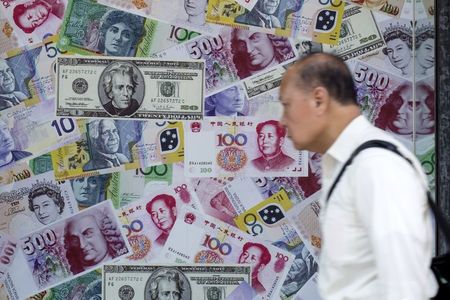
Investing.com — Asian currencies have seen a strong uptick in recent months, fueled by a combination of improving economic conditions, easing global inflation, and favorable trade balances.
As global economic conditions become more stable, the pace of this currency appreciation is expected to slow down.
Analysts at Capital Economics predict that while the upward momentum of Asian currencies may decrease, they are unlikely to experience a complete reversal.
“We expect most Asian currencies to make further gains over time, even if their biggest rallies may now be behind them,” the analysts said.
Several factors have fueled the recent rise in Asian currencies. The strength of many Asian economies, even amidst global economic challenges, has attracted investors.
The robust economic growth in countries such as China and India has increased demand for their currencies.
Moreover, improved trade balances, especially in export-oriented economies like South Korea and Taiwan, have further strengthened these currencies.
Another crucial factor has been the moderation of inflationary pressures globally. As inflation rates have begun to stabilize, central banks in Asia have been able to maintain relatively accommodative monetary policies.
This has contributed to a more favorable environment for currency appreciation, as lower interest rates reduce the cost of borrowing and encourage capital inflows.
Although Asian currencies have recently risen in value, there are several factors that suggest this upward trend may slow down. One key reason is the tightening of global monetary policies.
As central banks, especially the Federal Reserve, raise interest rates to support economic growth, the interest rate difference between Asia and other regions will decrease. This could make Asian currencies less attractive to investors looking for higher returns.
Moreover, the recent surge in currency values has started to weigh on the export competitiveness of some Asian economies.
As currencies appreciate, exports become more expensive for foreign buyers, which can dampen demand. This is particularly relevant for economies heavily reliant on exports, such as South Korea and Taiwan.
As a result, there may be a natural cap on how much further these currencies can appreciate without harming economic growth.
While the rally may slow, the long-term outlook for Asian currencies remains positive. Analysts at Capital Economics argue that structural factors, such as strong economic fundamentals, improving fiscal positions, and ongoing reforms in many Asian economies, will continue to support currency strength.
For instance, China’s ongoing efforts to shift towards a consumption-driven economy and reduce reliance on exports are likely to provide a more stable base for the yuan in the long term.
Additionally, geopolitical shifts, such as the increasing importance of Asia in global trade and investment flows, are expected to play a role in sustaining the strength of regional currencies.
As Asia continues to emerge as a key player in the global economy, demand for Asian currencies is likely to remain robust, even if the pace of appreciation slows.
However, there are risks to this outlook. A sharper-than-expected slowdown in global economic growth or a resurgence of inflation could disrupt the current trends.
Furthermore, any significant geopolitical tensions in the region could lead to increased volatility in currency markets, potentially reversing some of the gains made by Asian currencies.
This post is originally published on INVESTING.



